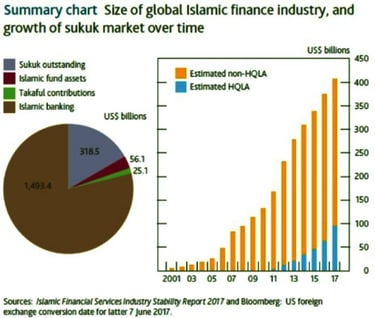Islamic Banking and Finance on the BOOM
The most promising mode prevailing


From a mere 2% on the onset of the 21st century, the Islamic Banking and Finance have grown 10X throughout the world. The growth has been over 50% annually since then. The share of Islamic banking now stands at a significant 20% of the world’s total banking and finance.
Let’s learn the basics of Islamic banking and finance:
Islamic banking and finance is a system that operates according to Islamic principles and guidelines. It is based on the concept of promoting ethical and responsible financial practices, which makes it an alternative and potentially better solution compared to conventional banking in some respects. Here are a few reasons why Islamic banking and finance can be considered a better solution:
Ethical principles: Islamic banking and finance are guided by Shariah principles, which emphasize fairness, justice, and ethical behavior. Transactions involving interest (usury) and gambling are strictly prohibited. This ethical framework promotes responsible lending and investment practices and encourages individuals and businesses to engage in activities that are beneficial to society.
Risk-sharing: Islamic finance emphasizes risk-sharing between the bank and the customer. In Islamic banking, instead of charging interest, banks enter into partnerships with customers to share profits and losses. This encourages a more equitable distribution of risk and promotes a sense of shared responsibility.
Asset-backed financing: Islamic finance encourages asset-backed financing, which means that transactions must be backed by tangible assets. This helps to reduce speculation and promotes investments in real economic activities. The focus on tangible assets provides a more secure and transparent framework for financial transactions.
Socially responsible investment: Islamic finance promotes socially responsible investment by discouraging investments in sectors that are considered harmful to society, such as gambling, alcohol, and tobacco. This encourages the allocation of funds towards more sustainable and socially beneficial sectors, which can contribute to long-term economic stability and social development.
Financial inclusion: Islamic banking and finance aim to provide financial services that are accessible to all segments of society, regardless of their religious beliefs. This inclusive approach helps to promote financial stability and reduce economic disparities by ensuring that individuals and businesses have access to the financial resources they need to grow and prosper.
Stability during economic crises: Islamic finance principles can help provide stability during economic crises. Since Islamic banks do not engage in speculative activities and focus on real economic transactions, they are less susceptible to the types of risks and vulnerabilities that can lead to financial crises. This stability can contribute to a more resilient financial system.
